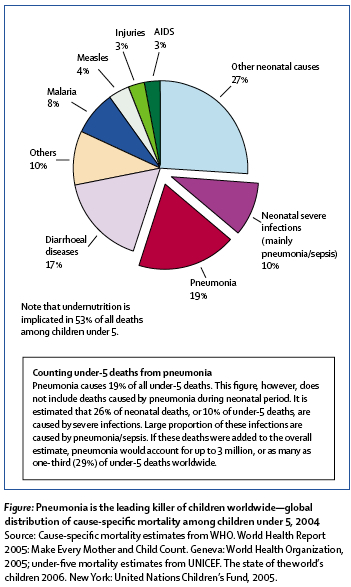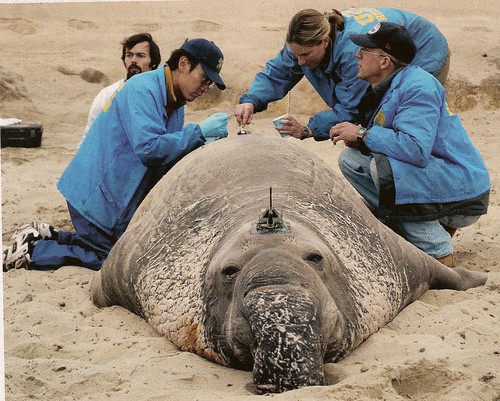At least when it comes to killing young children in the developing world. A recent Lancet article describes the devastation pneumonia causes among children:
Pneumonia kills more children than any other illness, more than AIDS, malaria, and measles combined... More than 2 million children under 5 years of age die from pneumonia each year, accounting for almost one in five under-5 deaths worldwide. Yet few headlines report the effect of pneumonia on children's lives.The world's attention has under standably turned to other major public-health scourges, such as HIV/AIDS, malaria, and tuberculosis. While we support these efforts, it is also important to recognise pneumonia's significant contribution to overall child mortality. Renewed efforts to improve child survival, especially within the context of the Millennium Development Goals, must ensure that pneumonia is adequately addressed.
For more than a decade, we have known which interventions reduce childhood pneumonia deaths. We know that preventing children from developing pneumonia is important. Key prevention measures include immunising children (especially with Haemophilus influenzae type b [Hib], measles, and pneumococcal vaccines) and promoting adequate nutrition (including exclusive breastfeeding and zinc intake); reducing indoor air pollution might also have an effect. In symptomatic HIV-infected children, daily administration of cotrimoxazole also reduces deaths from opportunistic infections, including pneumonia caused by Pneumocystis carinii. For newborn babies, reducing the incidence of low birthweight is important, as is ensuring warmth after birth and appropriate feeding.
We also know that once a child develops pneumonia, prompt treatment with a full course of effective antibiotics is life-saving because most severe cases are caused by bacterial pathogens.
Here's a pretty picture which shows how devastating pneumonia is to children:

Pneumonia blows AIDS and malaria out of the water--and TB doesn't even make the cut. When it comes to children's health, it's not the 'Big Three', but the boring, old Gram-negative and Gram-positive bacteria: diarrhea and pneumonia. So why is this issue neglected? Well, the Big Three are 'sexy.' AIDS in particular has sexy celebrity appeal:

Unfortunately, people like me are the only ones advocating fighting pneumonia and diarrhea, and we tend to be on this end of the phenotypic continuum:

This is no way to decide public health priorities. Another problem is that donors and funding agencies often divide and partition resources based on the disease, rather than viewing public health as an integrated system. In part, this has to do with ego. Donors too often want to cure a disease--what I like to think of as a millenialist approach wherein they 'solve' or 'end' a disease--not set up a system that decreases the effects of many diseases (I should also note that it's harder for organizations to convince their donors to support this because these efforts are seen as 'diffuse'). The authors write:
A new approach to reducing childhood pneumonia deaths is required that spans prevention and treatment, and as the recent multi-country evaluation of IMCI concludes, incorporates facility and community based components. Importantly, efforts to scale up community-based treatment must not be implemented in isolation from other efforts to scale up treatment for diarrhoeal diseases, HIV/AIDS, and malaria--all of which are key components of integrated child survival programmes. Preliminary results of one such integrated model, the Accelerated Child Survival and Development programmes in 11 countries in west and central Africa indicate that such integrated approaches might have a substantial effect on under-5 mortality.
We know what needs to be done to reduce childhood pneumonia deaths. Given its significant contribution to overall child mortality, pneumonia must assume a more prominent position on the child survival agenda.
In public health, we have to stop focusing so exclusively on diseases, and starting focusing more on capacity and infrastructure. That goes for developed countries too.
Update: AJ Milne at The Accidental Weblog has some thoughts on the matter.
- Log in to post comments

And they call you mad!
(That's how I say 'Good point'.)
Reminds me of the clueless (wealthy) non vaccinators who's children end up in hospital with pertussis. Oh my god, he's choking, he's chokig, he's blue, do something! They scream at you as you hold the O2 to the baby's face, suction a little, bag and mask at the ready to force the air in and save this innocent child of stupid people. When you point out to them that THEY are the ones who did this, They are the ones who denied their child protection from deadly disease, they seem puzzled that you would be so mean to them at a time like this. They have no idea that they have spit in the face of years of publis health, endangered their child's life, and that that makes nurses just a wee bit unsympathetic.
Yeah, clean water would do a hell of a lot more for the developing world than any medication.
nice walrus
that seal is 1 fat seal lol
nice walrus
sex shop
biber hapı